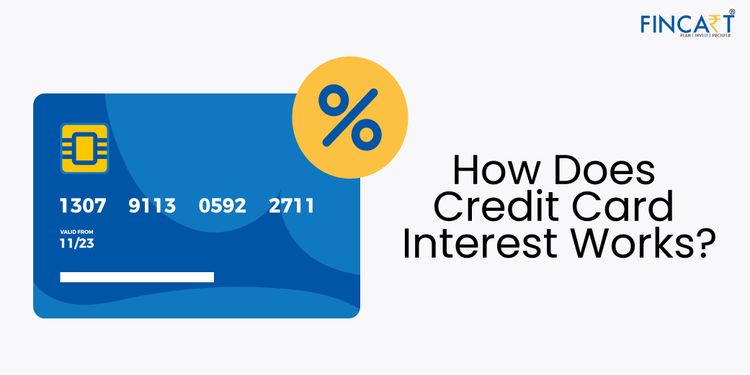Table of Contents
ToggleAs India progressed so did our way of utilizing money. There were times when cash was given the utmost importance. Soon, plastic cards took place the way of debit cards. However, credit cards took a big leap and moved ahead of all.
Earlier it was a privilege of a few but now the majority of people hold on to credit cards. Banks have cleverly accelerated credit card distribution by offering various rewards & redemption schemes. Naturally, many people who are not aware of how to use a credit card or how its interest works, end up facing debt consequences.
Well, in this blog, we’ll be resolving this misery by providing you with information on how credit card interest works:

What is a credit card interest rate & when is it applicable?
Credit card interest is the highest among the other financial products available. Thus, there are 3 scenarios when the credit card interest rate comes into the effect:
- No Payment Made by Due Date If this scenario arises then you will have to bear both late payment charges and credit card interest rates.
- Only the Minimum Amount Due is paid Under this scenario, you will be charged an interest rate that will be applicable from the day of purchase till the full outstanding amount is paid off.
- Cash Withdrawals It is best to avoid any cash withdrawals but if you have withdrawn then the interest from the day of withdrawal until the withdrawn amount is paid off in full.
How is interest calculated on credit cards?
Credit card interest generally goes from 36% to 48% on a yearly basis. This in financial terms is known as ‘Annual Percentage Rate (APR). The general interest rate charged per month is somewhere between 3-4%. This is in fact the costliest financial product because of the interest rate.
There is a specific period given to you known as the Grace period. This is the time between the date of the transaction process to the due date of payment for the billing date. This is generally for 20-50 days. During this entire tenure, the transactions made do not attract any interest, provided that you pay the entire outstanding amount.
Let’s understand this better with an example: Suppose you bought a phone for 10,000rs on 20th June. The interest-free period you have is for 20 days till 5th July. Until these 20 days you can enjoy the grace period but once these 20 days are over you’ll be required to make your payment, in order to avoid interest.
Thus, after 5th July you’ll be charged with interest. And this is how the grace period and interest rate work.
How to avoid credit card interest rates?
When it comes to spending, a credit card makes the process, effortless. Just one swipe or tap and there the transaction is done! This effortless spending in the end becomes a vicious debt trap. One should be brilliant to use this smart financial tool.
Mentioned below are some factors that you should consider to avoid credit card interest rates:
- Use Credit Card EMI
Similar to personal loans, credit cards offer you a facility to convert your payments into monthly EMIs. The process for availing of this facility is simple as you just pay the principal + interest monthly until your selected tenure. The average monthly interest rate on a credit card varies from 3% to 4% depending on bank to bank.
- Plan your Expenses Priorly
A credit card becomes the best source to utilize when a monthly budget of your expenditures is prepared for you. Under this budget, the list includes your expenses like rent, electricity, groceries, etc. Make sure that the budget is well within your income limit.
Secondly, if you are availing of any offer on a credit card then be sure to pay the balance in the same month before the expiration of the grace period. Keep a track of your expenses paid through a credit card and review them accordingly. If you are someone that often forgets the payment reminders then schedule your credit card for an auto-debit facility. This way you’ll be able to waive the heavy interest charges.
- Pay the balances in full
Although banks provide an option of minimum due, it is advisable to pay the credit card balance in full. The only thing that happens while paying the minimum due amount is that you won’t be charged a late fee. However, you are still being charged interest on the rest of the balance amount. Rolling over will also lead to high-interest payments as the annual Interest rate are 36%-48%. Once interest payments start it will be difficult to pay off the original balance. Thus, starting off the debt trap begins.
- Don’t use too many credit cards
An additional credit card seems to be a very tempting option as you get the extra credit limit and benefits. However, it is not recommended to use too many credit cards. With an increased credit limit unreasonable spending starts. Secondly, tracking multiple cards becomes a task, resulting in delayed payments. It is better to have no more than 2 credit cards.




